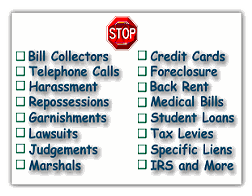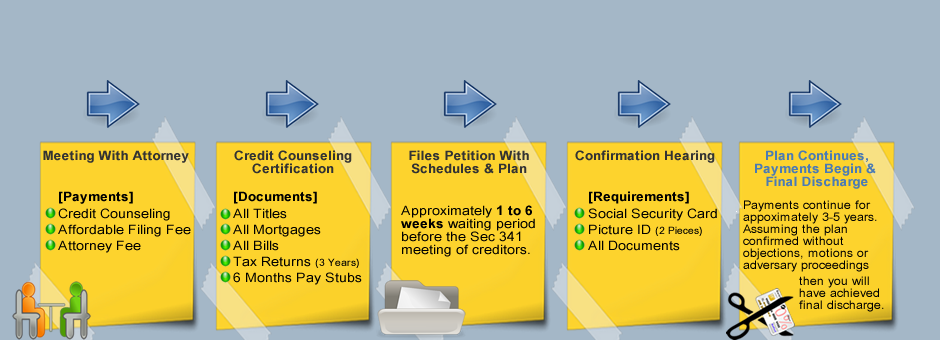Chapter 13 Bankruptcy
Chapter 13 Bankruptcy Information
What Is Chapter 13 Bankruptcy?
You Should Consider Filing A Chapter 13 Plan If You?
What Does Chapter 13 Mean For Me?
What Is the Chapter 13 Process?
What Is An Automatic Stay?
What Happens After A Chapter 13 Bankruptcy?
What Is Chapter 13 (Reorganization)?
In a chapter 13 case, you file a "plan" showing how you will pay off some of your past-due and current debts over three to five years. The most important thing about a chapter 13 case is that it will allow you to keep valuable property--especially your home and car--which might otherwise be lost if you can make the payments which the bankruptcy law requires to be made to your creditors. In most cases, these payments will be at least as much as your regular monthly payments on your mortgage or car loan, with some extra payment to get caught up on the amount you have fallen behind.
You Should Consider Filing A Chapter 13 Plan If You?
Own your home and are in danger of losing it because of money problems
Are behind on debt payments, but can catch up if given some time
Have valuable property which is not exempt, but you can afford to pay creditors from your income over time
You will need to have enough income in chapter 13 to pay for your necessities and to keep up with the required payments as they come due.
What Does Chapter 13 Mean For Me?
If you comply with all of the requirements of a Chapter 13 Bankruptcy, you can get out from under many of your bills, stop being harassed by Bill Collectors and get your life back together.
Georgia Family Law, P.C. will work with you to create a plan which allows you to repay some of your debts and have some of your debts extinguished at the end of the Bankruptcy Period which will either be 3 years or 5 years.
If you any or all of the issues below, then Filing a Chapter 13 Bankruptcy can protect you and your family.

What Is the Chapter 13 Process?
Below is a sample Flow of the steps and timelines for a Chapter 13 Bankruptcy.

May Be Your Best Option
What Is An Automatic Stay?
The protection of the bankruptcy law known as the "automatic stay" goes into effect immediately upon the filing of a Chapter 13 bankruptcy case. The automatic stay will force all collections activities to stop, including harassing creditor phone calls, collection letters, garnishments, foreclosures, repossessions, and civil lawsuits for debt collection.
A creditor can ask a bankruptcy judge to lift the automatic stay protection with a showing of good reason. The automatic stay remains in effect until it is lifted or until the Chapter 13 bankruptcy case is over and the debt is discharged. If the debt is discharged, the creditors will have no grounds to harass or call the debtor anymore because they now have no debts to collect.
What Happens After A Chapter 13 Bankruptcy?
Having to file for bankruptcy is something we all hope we never have to do in our lifetimes. However, like with other setbacks in life, you can recover. There may be different paths to recovery for each form of bankruptcy, but there is always hope!
You may have done everything you can to avoid bankruptcy but those sweet 0% interest credit cards may have gotten the better of you. Or your health or unemployment issues may have taken center stage in recent years, and you were left with no recourse but to declare bankruptcy. When considering your financial future following such an event, you can expect that trying to secure credit for the next 3 to 5 years is going to be tough. Also, you can expect this negative mark to appear on your credit report for the official length of time of 10 years.
It’s legal for creditors to keep financial events on your report for 10 years, but that’s not a hard and fast rule. So how does bankruptcy actually affect your credit? It does so by lowering your credit score by 200 +/- points (sometimes even more) — usually because of late payments on accounts and not just because you filed for bankruptcy. If you find yourself becoming overwhelmed by payments, then this is an ominous sign. This is one symptom that can eventually lead to serious financial consequences for you if you fail to make any changes to your situation.
Now the good news: if during the bankruptcy proceedings, you decide to reaffirm or keep some of your debt and you continue to take responsibility for these loans (e.g. your car loans or house mortgage), then you may have a shot here (to some degree) to lessen the damage done to your credit score and future credit worth in the eyes of lenders.
Additionally, there will be credit card companies (yes, they are out there) that will solicit you after the bankruptcy. You’ll be debt-free after all, right? Nevertheless, you should certainly be cautious and wary, although you may think of this as a second opportunity to do things the right way. While taking on new credit and applying for a secured credit card can be a way to rebuild your credit history, you’ll have to evaluate just how responsible you can be with handling debt all over again. You’ll need to tread down this road very carefully because if caution is not heeded, your actions could lead you back down the same path towards bankruptcy.
